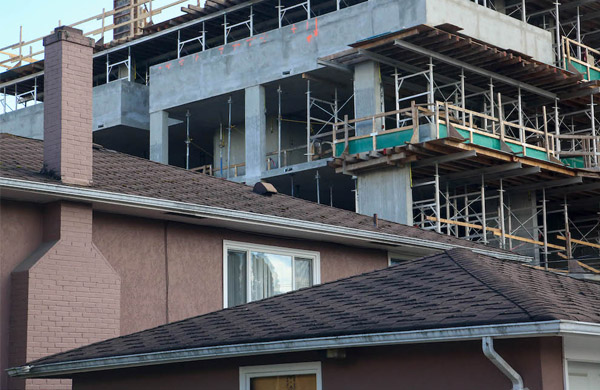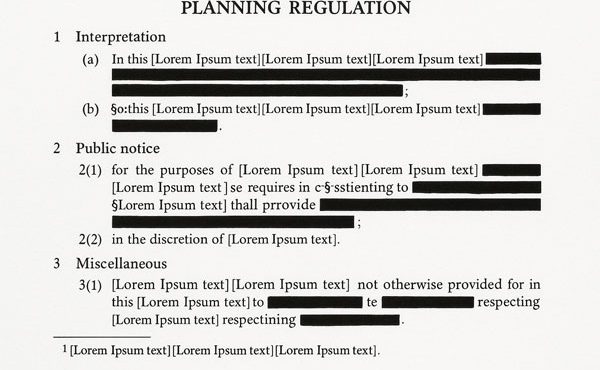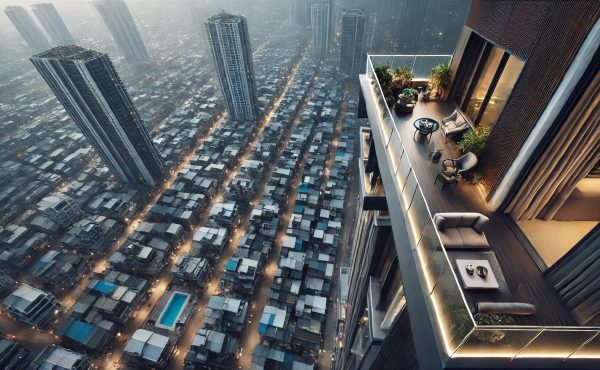
Do landowners own the air space above their properties?
“In the 1920s, property lawyers were puzzling over the aeronauts because air travel was just invented,” said Cameron Murray, an Australian economist visiting the University of British Columbia later this month. “If you fly over someone’s house, are you trespassing?”
The Latin expression Cuius est solum, eius est usque ad coelum et ad inferos — “For whoever owns the soil, it is theirs up to heaven and down to hell” — might be popular but is misleading, he says.
The vertical limits of property rights depend on how they are zoned. Anything higher than that is public air space.
Cities looking to grow will upzone land — that is, rezone for greater density — so that more people can live and work in the taller buildings that are erected.
However, this means that the city, a public body, is transferring public air space into the hands of private landowners. So what are they doing to make sure that the public is being compensated?
This is the problem explored in a paper by Murray and McMaster University research fellow and Canadian political scientist Josh Gordon, published in the journal Housing Policy Debate last year and titled “Land as Airspace: How Rezoning Privatizes Public Space (and Why Governments Should Not Give It Away for Free).”
“Upzoning simply makes the inequality inherent in property ownership worse,” said Murray. “You’re adding rights to property owners and giving nothing to non-owners.”
Questions about zoning are timely in British Columbia because the provincial government unveiled reforms last fall that will permit the densification of all single-family properties up to four units. The province will be announcing a few more new zoning tools in the coming months. With these pushes for more housing, municipalities are hurriedly reviewing what this means for their current community plans.
Murray recently visited Vancouver during these changes as part of a series of events this spring on housing and local democracy hosted by the University of British Columbia’s School of Architecture and Landscape Architecture.
As urban regions like Vancouver densify, the paper that Murray co-authored contains solutions from jurisdictions around the world that have implemented mechanisms to capture the lift in land values created by upzoning.
“A lot of places don’t give air space,” he said. “They sell it.”
Here are three solutions from Murray and Gordon’s paper for making upzoning more equitable.
A ‘betterment tax’
Property owners benefit from upzoning which causes their land to go up in value. Because they had nothing to do with that boost, some jurisdictions have a “betterment tax” in place to capture some of the lift created by a public decision around land use.
A betterment tax means that property owners can’t just go ahead and start building after their land is upzoned. Instead, they must buy the right to do so.
In the Australian Capital Territory, there is a betterment tax called a “leave variation charge.”
For example, a property with a low-rise building has been upzoned for the possibility of erecting a tower; if the owner of the low-rise wanted to tear it down and build a tower, they would have to pay the government a tax to access that higher-density zoning.
The tax is calculated like this: the value of the land under the previous zoning (in the above case, the low-rise) is subtracted from the value of the land under the new zoning (in the above case, for a tower). The government generally collects 75 percent of that difference in value created by the upzoning.
While the tax is a way for the government to help the public recoup the profits created through growth, it can face opposition from landowners, say Murray and Gordon.
Auctioning air space rights
Murray and Gordon give the example of São Paulo, Brazil, which sells air space rights in urban areas that the city wants to see redeveloped.
These rights are sold in an auction, and a percentage of the profits goes back to the city to pay for the infrastructure required to support the future density.
The uniqueness of an auction means that the private parties bidding for these rights are the ones who decide what they are worth. This saves governments the hassle of determining what would be a fair percentage to charge landowners for the land lift created through upzoning.
Upzoning for public players
By upzoning properties owned by public agencies, the benefits can be used for the sake of the public.
In Singapore, the state’s Housing and Development Board will buy and upzone land for public housing.
In the Netherlands, municipalities purchase rural land, develop it, upzone it and sell it to the private market.
In Hong Kong, the MTR transit operator benefits from upzoning by developing and managing its properties, allowing it to provide housing and reinvest profits back into public transportation.
Zoned out?
In 2032, the Summer Olympics will be coming to Brisbane, Australia, where Murray lives.
“[The government] has acquired seven hectares of riverfront land for an Olympic venue in 10 years’ time,” said Murray. “All of a sudden, there’s money, there’s land, there’s plenty of space to do whatever you want. But when it’s community housing, parks, and facilities? It’s like, ‘Sorry guys.’”
Why are some governments so averse to taking a more active role when it comes to housing and upzoning?
“I think we’re used to it because there are political and economic incentives over the long term that seep into politics,” he said. “People don’t want cheap houses. Councillors don’t want cheap houses. Investors, landlords, property owners, provincial state governments, they don’t want cheap houses. The average politician in Australia has 2.5 houses worth a million dollars each.”
A favourite quote of Murray’s comes from Charles Darwin’s visit to Sydney in 1836.
“The number of large houses just finished & others building is truly surprising: & with this, everyone complains of the high rents & difficulty in procuring a house,” wrote the famous biologist in his diary.
“It’s the first thing he writes before he knows anything about the animals,” said Murray. “The free market makes housing cheap? I’m not so sure that is the answer.”
…
Christopher Cheung is a reporter at The Tyee, where this story originally appeared.





One comment
In Toronto, the community benefits/s. 37 system was a crude and inconsistent way to do this. Interesting to learn about more systematic systems around the world.